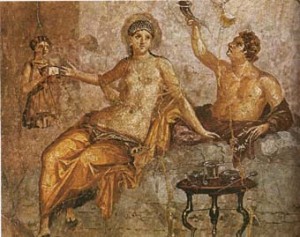Perilous leisure (Catullus 51)
A common Roman view was that leisure (otium) made men debauched and effiminate, says Lauren Jeschke, and that was not at all the image Catullus wanted to convey when he was wooing Clodia with this poem translated from Sappho. This makes the last, extra stanza he added connect with Sappho’s original Greek. Catullus 51, read, translated, and discussed by Lauren Jeschke.
Ille mi par esse deo videtur,
ille, si fas est, superare divos,
qui sedens adversus identidem te
spectat et audit
dulce ridentem, misero quod omnes 5
eripit sensus mihi: nam simul te,
Lesbia, aspexi, nihil est super mi
<vocis in ore;>
lingua sed torpet, tenuis sub artus
flamma demanat, sonitu suopte 10
tintinant aures geminae, teguntur
lumina nocte.
otium, Catulle, tibi molestumst:
otio exsultas nimiumque gestis:
otium et reges prius et beatas 15
perdidit urbes.


latin-poetry-podcast Said,
May 17, 2012 @ 2:15 pm
Nice job sketching out the complicated interrelationships between literature and life behind this poem, Lauren! Good work expanding the Latin sightly in the translation to make it more intelligible in English.